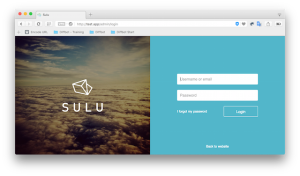
Sulu CMS: a CMS for the next generation. Based on the newest Symfony with all the bells and whistles, it takes a bit of getting used to. Allow me to help!

Sulu CMS: a CMS for the next generation. Based on the newest Symfony with all the bells and whistles, it takes a bit of getting used to. Allow me to help!
PHP - the server-side programming language powering over 80% of the web - is now at version 7.1. Bruno shows us how to get started with PHP.

Zack Wallace goes through how to set up Vagrant, the popular virtual machine software, on a Windows machine.

Scott Molinari takes a look at Packer and analyzes its viability for the typical PHP developer of today - find out whether or not it's worth learning about!

A tutorial on how to configure a local Satis instance for offline composer access on conferences or as packagist backups for companies - even on VMs!

In this tutorial, we go through some effective performance hacks for developing Symfony apps on Vagrant virtual machines

Jehan introduces Please, a bash script for automating the installations of many CMSs and Frameworks by configuring them automatically into your Vagrant box.

Matt Geri explores the various modern development tools that can help take the headache and repetitiveness out of building WordPress sites on your computer.
Parham dives into Vagga - a lightweight alternative to Docker useful for containerized development environments - and builds a PHP environment!
Docker Explained! Younes goes through the process of building a sample Laravel + MySQL app powered by two docker containers - check it out!
Bruno implements WP-API and OAuth into a WordPress installation, allowing other outside apps to hook into WP and use API calls to make posts!
Bruno Skvorc reintroduces Vagrant driven development in a post that covers the theory behind it - the what, the why, and the how.
In this article we cover what Wocker is and how to get started using it. Wocker is easy to install and can streamline the workflow for WordPress developers.
In this recap post, Bruno Skvorc lists some of the most important and most relevant resources for getting started with PHP7.
The first of a four part series on Docker. This article (part 1) is an introduction to Docker and how you can start using Docker for WordPress projects.
Tired of setting up new virtual hosts for every new project? Make your server of choice do it automatically. Bruno Skvorc shows you how.
Chassis is a simple Vagrant configuration rapidly growing in popularity. In this article we show you how to easily set up Chassis for WordPress development.
Aldo Ziflaj lists five easy-to-use alternatives for your Vagrant needs. Get started using VMs for your PHP development TODAY!
Bruno Škvorc demonstrates in a step by step procedure how one can get a Drupal 8 site fully up and running in under five minutes
A guide to using PHPbrew and VirtPHP to achieve perfectly fast virtual environments for development and testing on multiple PHP versions
AldoZiflaj introduces us to a Vagrant configuration that's perfect for getting started with cross platform mobile development.
StackEdit has reached a new milestone version - 4.0. See what's new, how to run it locally, and how to enable multiple instances!
Here's how you can install Recki-CT and JitFu into a vagrant box in 4 short steps
The grand finale is here: Aleksander Koko finishes his series by binding the EmberJS side with Laravel into one whole Single Page App.
Alexander Koko continues his series by explaining how you can build REST resources with Laravel and its command line tool, artisan.
Php 5.6 has been released. Learn what's new, how to upgrade and install it into your VMs, and what to do next to master it
Aleksander Koko continues his REST app tutorial by building the database and faking some content into it. Ready for advanced features? Jump in!
This quick tip will show you how to install Phalcon on a Homestead Improved instance, and will help you get a sample Phalcon app up and running
Aleksander begins a series on building a REST application on Heroku with REST API, EmberJS and Laravel. Part one sets up our project structure and database!
In this article we discuss managing development environments with Varying Vagrant Vagrants (VVV), a Vagrant configuration built for WordPress developers.